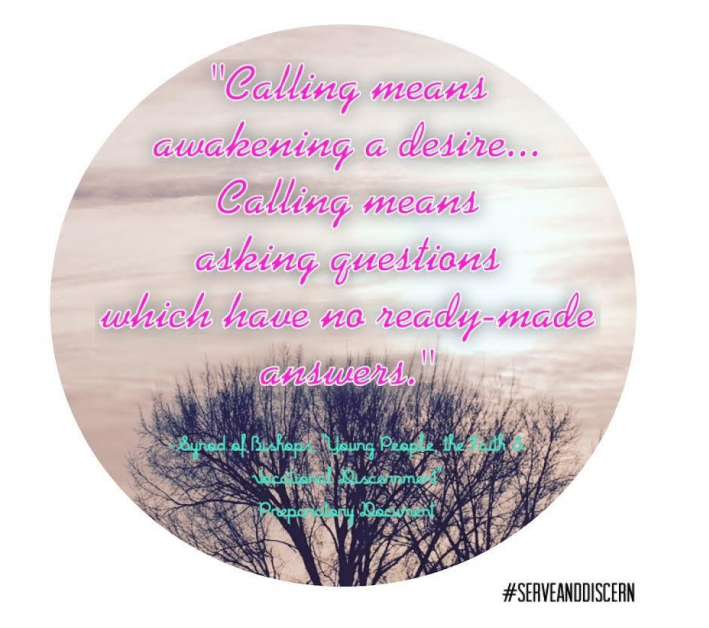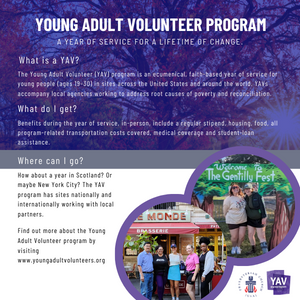From the 20-Week Discernment Series, by Benedictine Volunteers
The Benedictine Volunteers 20-Week Vocational Discernment Series is inspired by the Synod of Bishops’ “Young People, the Faith and Vocational Discernment” Preparatory Document. In this reflection, we explore “Calling: Awakening to the Mystery with Brave Response.”
What is ‘calling’? How does it appear in our lives? When we hear its messages, how can we posture ourselves to receive its meanings?
Pope Francis describes calling as ‘awakening a desire.’ To hear a call, we must first be awake. Awake-ness is a conscious posture of seeing and hearing. When we are awake, we choose to see, hear, and receive what is happening both around us and within us. Calling is also explained as ‘asking questions which have no ready-made answers.’ When we are awake to all that is happening around and within us, we can then begin to ponder and ask questions about these experiences. The questions associated with calling often carry an intimate quality of mystery, unknowing, and discomfort.
Calling can appear in a variety of forms. Sometimes it’s a soft nudging, an intuitive sense of the heart. Sometimes it’s a strong, direct message that seems to be screaming at us straight in the face. Other times it’s a quiet, almost silent murmur deep within the soul. God speaks to everyone differently, so the ways calling appears in our lives will also be unique to our own journey, our relationship with God, and the creative happenings around us. Often times, calling appears and reappears in our lives, again and again. If we are open to it, we can receive its sacred messages and implications for our lives.
Mystery is both magical and uncomfortable. The magic of mystery is its newness, possibility, and opportunity. The discomfort of mystery is the holding of the unknown before the newness can birth itself into fullness of life. Jesus experienced this very mystery of calling in his own life. From a young age, Jesus had an intimate relationship with God and sensed that God was asking of Him something very special. A young Jesus who senses a nudging leaves his parents and goes to the temple to ask questions of the elders. A young Jesus who experienced a strong urging, directly shares his thoughts and feelings with his family, As the nudging and urging becomes more frequent and increasingly clear, Jesus chooses to leave home and embark on a journey in order to respond to God’s calling.
We each have choice in calling. We can choose to overlook, ignore, suppress, and pause. Or, we can choose brave response to the mystery. To be brave doesn’t mean we have all the answers. To be brave means we are open to listening and exploring God’s unknown plan for our lives. To be brave means to be like Jesus who in his humanness, did not fully comprehend God’s plan, but was willing to engage with the questions authentically and invite God’s tenderness into the journey of mystery.
Questions for Reflection:
- How has ‘calling’ appeared in your life’s journey? In what ways have you listened or, not listened, to the calling?
- Name a few roadblocks or resistances (i.e. personal, familial, cultural, and societal) you have experienced along this journey.
- What in your life currently feels like a ‘mystery’? When you sit prayerfully with this mystery, where does God seem to be nudging and urging?
Thank you for reading! The Shared Visions newsletter is made possible through the partnership of Catholic Volunteer Network and Catholic Apostolate Center.




 Thousands of faith-based service opportunities can be at your fingertips with the RESPONSE. Download the latest edition today!
Thousands of faith-based service opportunities can be at your fingertips with the RESPONSE. Download the latest edition today!
